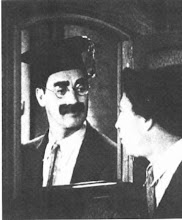When you write something, you want to express yourself, correct? You want people to read, absorb and possibly enjoy your thoughts. So why do so many folks out there make it so difficult?
OK, I'm not going to talk about the difference between "its" and "it's" (although I don't understand why people who wouldn't think about putting an apostrophe in the possessives "his", "hers", "theirs", "ours", etc., can't resist putting one into "its"). I'm not going to talk about the obvious differences between "your" and "you're" or "their", "there", and "they're". I'm not going to point out that there's no "A" in "definitely". I won't spend much time on those little wooden signs that so many people have hanging from their mailboxes that say "The Peterson's" (The Peterson's what? The Peterson's illiteracy is on display for the entire world to see?) I won't spend much time on the fact that the professionally-produced signs in the grocery stores that say "Low Prices Everyday" are nonsensical (major kudos to our friends at Fresh Market, however, for putting up "10 items or fewer" signs), Or the fact that "setup" and "shutdown" are nouns while "set up" and "shut down" are verb phrases. Or that "preventive" is an adjective while "preventative" is a noun, and therefore the guy that comes to your house is not performing preventative maintenance on your furnace. Volumes have been written on this sort of thing already, and God knows they don't seem to be doing much good.
There are times, however, when spelling can really make a big difference. There are times when knowing the correct spelling of a word can completely alter what one is trying to say.
There is one pair of words that seems to completely elude an alarming number of e-mail authors, chat room participants, bloggers, and other folks who toss things around the electronic world. Consider these two sentences:
"I was afraid to go to the doctor because I thought I might loose my bowels."
"I was afraid to go to the doctor because I thought I might lose my bowels."
I think most people would agree that these two sentences express
very different concerns on the part of the writer, and yet almost daily I read that some poor person "looses his way" whenever he travels, or some such.
Here's another example where knowing how to spell what you mean can make a difference in what you're trying to say.
"I was wary of having sex with him."
"I was weary of having sex with him."
Fine. The end result of these two sentences very probably is the same (no sex with him), but the difference in spelling speaks volumes about what went on before that moment.
Most recently, I've seen a couple of examples of word substitution/misspelling that would never have even occurred to me. I had to read the sentences multiple times just to understand what (I think) the person was actually trying to say. Consider:
"At dinner, the mother preferred her daughter's company to the lecherous old man."
"At dinner, the mother proffered her daughter's company to the lecherous old man."
One of those sentences makes me want to read further. The other makes me want to find something else to read. My preferences are not the subject of this essay, so mind your own business.
If you're out there writing something and you have the least bit of doubt about the use or spelling of a word you want to use, please look it up. There are online dictionaries now. You can go to your Google or Yahoo! search bar and type "define proffer" and you'll get dozens of listings.
Closing note: Long ago, I was watching the news one evening. There was an interview with a representative of a special-interest group trying to get some legislation or other through Congress, and the subscript at the bottom of the screen said:
FRED BERKENDORF, LOBBIEST
Seriously. Apparently Mr. Berkendorf was the lobbiest person the producers in the newsroom had ever encountered, and they wanted the viewing public to know it.






 No joy. It wouldn't play. Idiot that I am, I went through this same exercise until, at one point, I pressed "Eject", the little screen scrolled over the word EJECT and..... nothing happened. Crap. Now I'm pushing buttons like some monkey in a lab trying to get a food pellet and the CD player is completely ignoring me. The bastard.
No joy. It wouldn't play. Idiot that I am, I went through this same exercise until, at one point, I pressed "Eject", the little screen scrolled over the word EJECT and..... nothing happened. Crap. Now I'm pushing buttons like some monkey in a lab trying to get a food pellet and the CD player is completely ignoring me. The bastard.






